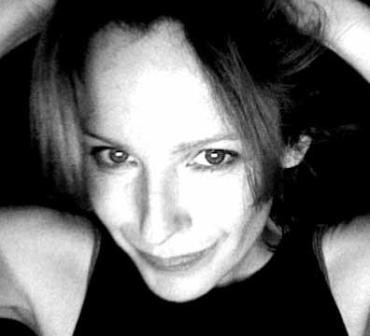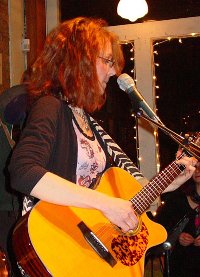 |
Ilsabe O'Connell
Musical Discoveries: How are you Ilsabe?
I'm doing well. I just woke up from a long winter's nap, looking forward to a lazy Sunday.
Before we get two far into this, I wonder if you know approximately how many times you have been asked how your name is pronounced?
People usually don't ask before the inhumane butchering begins. PETA should take up my cause. I've heard just about everything. Il-slob-be is my least favorite.
During the first roll call of the school year, I waited for that certain confused look to appear on a teacher's face, then quickly shouted out, "here," before he or she could take a stab at it. It's Il'-suh-bee, with accent on the first syllable.
Where does your love for this style of music spring from/what draws you into it? It doesn’t seem quite avant-garde enough for someone with an artist’s husband and a Masters Degree in Art History!
Well, keeping up with the avant-garde is exhausting business. I lean toward Huey Lewis on this one -- it's "hip to be square."
When you first decided to make Little Lost Cause what kinds of things did you want to capture or have the album portray about you as an artist?
My first concern was little more than the creation of graffiti. I wanted a finished piece of work that was tangible, that would leave–-literally–-a record saying "Ilsabe was here." And then, since this all came about in an especially nasty political climate, I began hoping for a bit more, that people would respond to lyrics that weren't strictly black/white, left/right. I hoped the album would convey actual thoughts--however incomplete--rather than opinions.
How closely did the album turn out as compared to your original vision for it?
The vision was so sketchy to begin with--I knew from the start that the album would develop organically, and that as long as I worked with people I liked and respected, something decent would come of it. However, in the beginning, I was worried that the songs varied too much stylistically and that the album would not sound coherent. It was a relief to finally come up with "Tonight on the Carnival Midway," which gave me the vision in retrospect. Carnival freak shows are all about the unexpected and unpredictable.
 |
As an artist I imagine that you draw inspiration form a variety of places. What places do you feel you draw from most when you are songwriting?
I never know where a song will come from, and it's frustrating to go weeks without a single viable idea. Usually just a phrase enters my mind, and there's a lyrical quality to the words that suggests a melody. I have to figure out what the phrase means and then build around it. Sometimes ideas come when I stop trying so hard to force them. "All That's Left," for example, was written less than a week after I'd decided that I would never be able to write a song about that particular subject. I draw a lot on human frailty, being honest with ourselves about our limitations, learning to love each other in spite of our shortcomings or sometimes because of them. I find such things uplifting, while I realize others may find them depressing.
Do you try to embrace your influences when they spring up in your music or do you feel that you need to distance yourself somewhat from them?
I don't want to write a song that sounds derivative, or that tries to swipe someone else's style. On the other hand, I don't believe you should try to distance yourself too much from your influences, because you have to acknowledge the debt. If someone compares me to Lucinda Williams, I am certainly not going to distance myself! I didn't invent this kind of music, and I'm not trying to score points for originality. I question the whole concept of "originality." There really is nothing new under the sun, except maybe when it comes to honesty and integrity, which are always refreshing, if not new.
"Over Your Head" is one of my favorite songs on the record. For those who have not had the privilege of hearing the album yet, could you tell us a little about that song and where the inspiration for it came from?
 |
Any time you turn on the TV, you can find people acting self righteously, pointing fingers at others, casting blame, which is a natural defense mechanism.
Many of us watching may even want to jump up, pump our fists in the air and shout, "Damn straight!"
We always want to take up sides, and this seems easier than coming to a better understanding of each other.
In the grand scheme, there are no absolute sides, because we don't have the wisdom of God--no matter what some may claim. As human beings we are all, in a sense, in over our heads.
Is there a particular song on the album that you feel best represents who you are, both personally and professionally?
Songwriting is somewhat like writing a short story in that some elements are taken from personal life, but much is fiction. You combine your own life with what you only know intellectually and then edit, edit, edit. Of all my songs, "All That's Left" is the most personal. My father suffered from depression and took his own life at the age of 36. I was afraid to exploit his death by writing something overly sentimental or just plain bad. And yet this event shaped my life, undeniably. The song is appropriately sad, but ends on a hopeful note. I am happy now, but also aware that I meet people every day who are only several steps away from where he was. I would never intentionally write a song that made life seem less worth living.
I read on your site and in your album liner notes that you are a part of the Old Town School of Folk Music in Chicago. Can you tell us a little about them and how you came to be a part of them? It appears that the played a large part in this album coming into being.
The Old Town School offers group and private lessons in a number of instruments. Group lessons are particularly enjoyable, because folks from different walks of life join together doing something they all love, albeit aren't always so good at. Old Town is also about excellent professional musicians who happen to make necessary cash teaching there. One evening I asked one of these musicians, Eric Lugosch, to listen to a song I wrote. My voice shook and the delivery was altogether bad, yet I trusted he'd see past all that. After I finished, Eric said, "That's good, but now do it again and this time like you mean it." Here's where I realized that meaning it and playing it like you mean it are two different things. Eric graciously agreed to accompany two songs on the album. I also rounded up banjo player Steve Rosen and Bob Goins from Old Town. It's pretty much one-stop shopping for all your musician needs.
 |
At the end of the day, what are some of the thoughts/feeling that you hope people take with them after hearing your music?
I would like for the album to come across as the collaborative effort that it is. I relied especially heavily on Bob Goins' (who nailed lead guitar solos in so many songs, including "Over Your Head", and on the musical instincts of my producer, Brian R. Johnson. And there are numerous others who helped invaluably.
Most of all, I have my husband Mitch to thank for encouraging me not to worry about what other's think, or at least not to let such worry stop me from putting my stuff out there. Might as well try.
Thanks so much for your time. I truly love this album and wish you all the best. Do you have any parting thoughts that you’d like to leave our readers with?
Thank you for spending valuable time on independent music!
|
More Islabe O'Connell: Little Lost Cause (2006) Interview, review and HTML © Mark Fisher and Russ Elliot 2006 Image © Defend Music Inc 2006 Last updated 30 December 2006 |